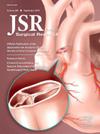早期肝细胞癌的消融治疗和手术:网络 Meta 分析。
IF 1.7
3区 医学
Q2 SURGERY
引用次数: 0
摘要
背景:我们比较了射频消融(RFA)、微波消融(MWA)、低温消融和肝切除(LR)后肝细胞癌(HCC)的总生存期(OS)和无病生存期(DFS),旨在评估早期HCC的治疗方案:方法:检索了 PubMed、Web of Science 和 Cochrane 数据库中 2004 年 4 月 1 日至 2024 年 4 月 1 日期间的研究。使用随机对照试验工具对文章进行质量评估。两个工具和纽卡斯尔-渥太华量表。使用 Stata 15.0 和 r 4.2.3 对从文献中获得的数据进行了筛选。评估的主要结果是1年和3年的OS和DFS:结果:共纳入25篇文献,4548名患者,其中中国大陆13篇,其他地区12篇。就1年的DFS而言,与RFA相比,LR的危险比(HR)为0.54(95%可信区间(CrI):0.38-0.76);与MWA相比,LR的危险比(HR)为0.57(95%可信区间(CrI):0.3--0.82)。与RFA相比,LR的3年DFS HR为0.52(95% CrI:0.38-0.72),与MWA相比,LR的3年DFS HR为0.53(95% CrI:0.37-0.76)。在中国大陆,LR的1年和3年生存率可能优于MWA,但与RFA相似。在其他地区,LR患者的DFS优于MWA和RFA患者。其余比较结果无统计学意义:结论:对于早期 HCC,LR 在减少肿瘤复发方面可能比消融治疗更有效。低温消融可能是治疗 HCC 的一种潜在方法。不同地区治疗效果的差异值得进一步研究。本文章由计算机程序翻译,如有差异,请以英文原文为准。
Ablative Treatments and Surgery for Early-Stage Hepatocellular Carcinoma: A Network Meta-Analysis
Background
We compared overall survival (OS) and disease-free survival (DFS) for hepatocellular carcinoma (HCC) following radiofrequency ablation (RFA), microwave ablation (MWA), cryoablation, and liver resection (LR), with the aim of evaluating treatment plans for early-stage HCC.
Methods
Studies in PubMed, Web of Science, and Cochrane databases from April 1, 2004, to April 1, 2024, were searched. Articles were evaluated for quality using the randomized controlled trials tool. Two tool and the Newcastle–Ottawa Scale. Data obtained from the literature were netted using Stata 15.0 and r 4.2.3. The assessed primary outcomes were OS and DFS at 1 and 3 y.
Results
A total of 25 publications with 4548 patients were included, including 13 studies in mainland China and 12 in other regions. For 1-y DFS, the hazard ratio (HR) was 0.54 (95% credible interval (CrI): 0.38–0.76) for LR compared with RFA and 0.57 (95% CrI: 0.3–-0.82) for LR compared with MWA. For 3-y DFS, the HR was 0.52 (95% CrI: 0.38-0.72) for LR compared with RFA and 0.53 (95% CrI: 0.37–0.76). In the Chinese mainland, LR may have a better 1- and 3-y DFS than MWA, but similar survival to RFA. In the other regions, LR had a better DFS than MWA and RFA patients. The rest of the comparisons were not statistically significant.
Conclusions
For early-stage HCC, LR may be more effective in reducing tumor recurrence than ablative treatments. Cryoablation may be a potential treatment for HCC. The differences in treatment effectiveness in different regions are worth further study.
求助全文
通过发布文献求助,成功后即可免费获取论文全文。
去求助
来源期刊
CiteScore
3.90
自引率
4.50%
发文量
627
审稿时长
138 days
期刊介绍:
The Journal of Surgical Research: Clinical and Laboratory Investigation publishes original articles concerned with clinical and laboratory investigations relevant to surgical practice and teaching. The journal emphasizes reports of clinical investigations or fundamental research bearing directly on surgical management that will be of general interest to a broad range of surgeons and surgical researchers. The articles presented need not have been the products of surgeons or of surgical laboratories.
The Journal of Surgical Research also features review articles and special articles relating to educational, research, or social issues of interest to the academic surgical community.

 求助内容:
求助内容: 应助结果提醒方式:
应助结果提醒方式:


